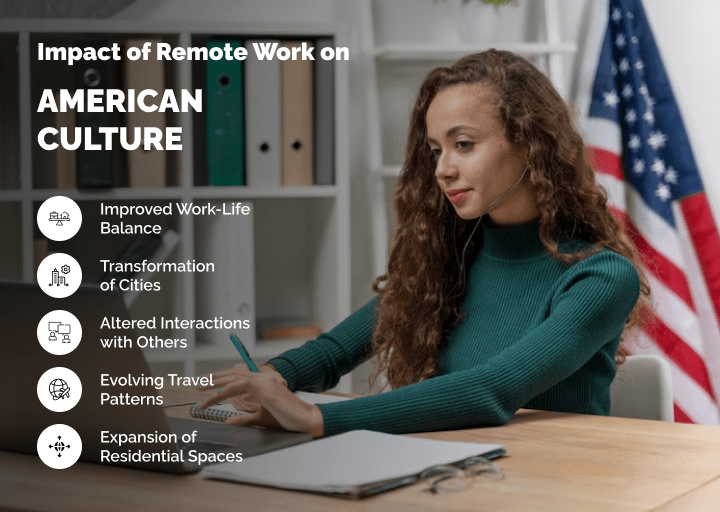Remote work has been transforming the American way of life and our work environments over the past few years. While tech philosophers have been discussing the culture-altering potential of generative artificial intelligence (AI), the shift to remote work has emerged as the most significant technological influence on our culture. Here, we explore the five major ways in which remote work is reshaping American society.

Transformation of Cities
Opinions vary among experts regarding whether the remote work revolution will weaken or strengthen cities and urban living. However, surveys and studies indicate that remote work has led to a more suburban and exurban lifestyle, with more individuals staying at home during the day rather than commuting to urban areas. Consequently, cities are experiencing significant changes. Planners are repurposing unused office spaces into residential units, while state and local governments are revising regulations to facilitate this transition. Cities that successfully convert offices into homes can anticipate population growth and increased livability and affordability.
Expansion of Residential Spaces
Remote work is driving demand for larger American homes and yards. Previously, proximity to the workplace was crucial in order to minimize commute times, prompting the construction of numerous small, cramped housing developments for commuting developers. However, with millions of individuals now expecting to work remotely indefinitely or commute less frequently, the real estate market is witnessing a surge in demand for more spacious homes situated farther away from city centers. Consequently, home builders are responding to this remote work-induced demand by constructing larger houses, often featuring dedicated home offices, and providing more extensive yard space.
Evolving Travel Patterns
Before remote work became prevalent, a family vacation typically entailed finding a time when everyone had time off from school and work. However, the ability to work from anywhere has transformed vacations, with many individuals now working full or part-time while on trips. This has given rise to the concept of “workcations” and “Bleisure” travel, where work and leisure activities are combined. Additionally, individuals are taking “hush trips,” secretly traveling without informing their colleagues or superiors at their home offices. Advice articles have shifted from discouraging work during vacations to providing guidance on how to balance work and leisure effectively.
Altered Interactions with Others
The surge in remote work during the pandemic led to the widespread adoption of video calls, primarily through platforms like Zoom and Microsoft Teams. As a result, many individuals began utilizing real-time digital collaboration tools. Although video calls and remote collaboration tools have been available for years, they have now become the preferred choice for remote workers. Previously, in-person or audio calls were more prevalent. The popularity of these tools is evident in Apple’s introduction of Freeform, a real-time shared whiteboard that supports embedded FaceTime video calls. Apple’s decision to offer this tool to the general public reflects the mainstream adoption of video calls and online collaboration tools brought about by remote work.
Improved Work-Life Balance
Companies have long been striving to enhance employees’ work-life balance, but remote work has brought significant improvements for millions of individuals. With the time previously spent on commuting now available, remote workers can allocate more time to their families and personal well-being, while also dedicating additional time to work. This automatic improvement in work-life balance has resulted in various trends, such as “quiet quitting,” “great resignation,” “quiet constraint,” “career cushioning,” “rage applying,” and the more recent “bare-minimum Mondays.” These trends reflect employees’ determination to no longer sacrifice everything for their employers and instead prioritize achieving a healthy work-life balance.
Technology has always influenced culture, but the pace at which remote work has transformed our society is unprecedented.